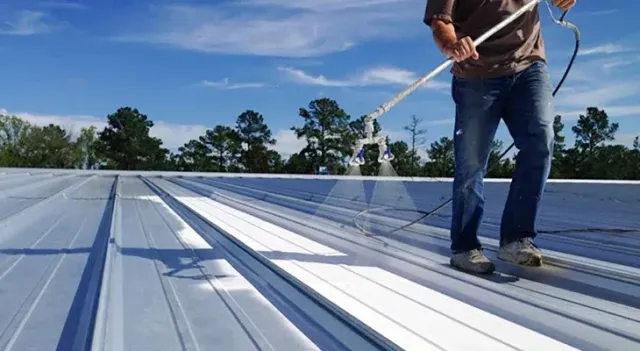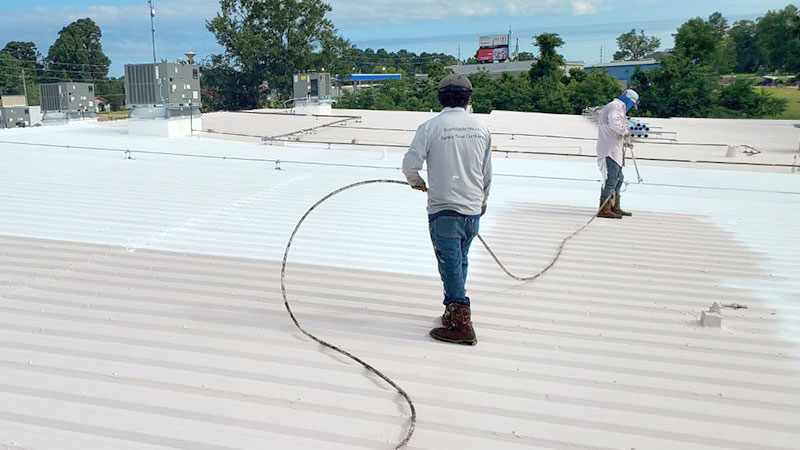Roof coatings protect and extend the life of roof coating systems, offering value to both residential and commercial property owners. Applying roof coatings throughout the year provides distinct advantages regardless of the season. This article examines these benefits, guiding property owners in making informed decisions about Professional Roof Coating Services.
Why Roof Coatings Matter in Every Season
Roof coatings offer continuous protection and improve roof performance. Different weather conditions throughout the year expose roofs to unique challenges such as heat, moisture, snow, and wind. Applying coatings in all seasons ensures the roof remains shielded against these effects, preventing damage and costly repairs.
Seasonal Weather Impact on Roofs
Roofs face varying weather stress:
- Summer: Intense sunlight causes UV damage and heat absorption.
- Fall: Cooling temperatures and falling debris can degrade roof surfaces.
- Winter: Freeze-thaw cycles, ice buildup, and moisture infiltration increase wear.
- Spring: Rain and melting snow create moisture challenges and potential leaks.
Regular roof coating applications keep roofing materials resilient to these seasonal stresses.
Benefits of Applying Roof Coatings in Hot Weather
Applying roof coatings during warmer months boosts energy efficiency and protects the roof from UV rays and thermal expansion.

Reflects Solar Radiation
Reflective roof coatings reduce heat absorption, lowering indoor temperatures and cutting cooling costs in summer months.
Minimizes Thermal Expansion Damage
Heat causes roofing materials to expand and contract, which can cause cracks. Roof coatings form a protective layer that absorbs and distributes thermal stress evenly.
Benefits of Applying Roof Coatings in Cold Weather
Cold weather conditions test a roof’s ability to resist moisture and freeze damage. Applying roof coatings before or during winter adds an extra layer of defense.
Prevents Water Penetration and Ice Damage
Coatings seal small cracks and pores, stopping water from entering the roofing system. This helps prevent ice dams and freeze-thaw damage.
Enhances Roof Durability
Some roof coatings remain flexible in cold temperatures, preventing brittleness and cracking during freeze cycles.
Benefits of Applying Roof Coatings in Wet Seasons
Periods of heavy rain or snow expose roofs to moisture risks. Coatings create water-resistant barriers that protect the roof’s structure.

Increases Waterproofing
Roof coatings reduce water absorption and stop leaks, preventing damage to insulation and building interiors.
Protects Against Mold and Mildew
By preventing water infiltration, coatings reduce the risk of mold growth on and beneath roofing materials.
Comparing Roof Coatings by Season: A Table Overview
| Benefit | Summer Application | Winter Application | Wet Season Application | Fall Application |
|---|---|---|---|---|
| UV and Heat Protection | High | Low | Moderate | Moderate |
| Water Resistance | Moderate | High | Very High | High |
| Flexibility in Temp. | Moderate | High | Moderate | Moderate |
| Energy Efficiency | High | Low | Low | Moderate |
| Durability Improvement | High | High | High | High |
How Regular Roof Coating Application Extends Roof Life
Consistent roof coating applications reduce surface wear and weathering, slowing down the aging process of roofing materials. Coatings provide a sacrificial layer that takes on environmental damage instead of the underlying roof.
Reduces Maintenance Needs
Coatings help maintain roof integrity, reducing the frequency and cost of repairs.
Enhances Structural Integrity
Waterproof coatings prevent moisture damage, which can weaken roofing structures over time.
Energy Efficiency Gains from Year-Round Roof Coatings
Roof coatings with reflective or insulating properties contribute to better temperature regulation inside buildings throughout the year.
Lowers Cooling and Heating Costs
Reflective coatings reduce heat gain in summer, while some insulating coatings help retain heat in winter, improving energy efficiency in both cases.
Supports Sustainable Building Practices
By reducing energy consumption, roof coatings contribute to lower carbon footprints for residential and commercial properties.
Common Questions About Applying Roof Coatings Across Seasons
How does temperature affect roof coating application?
Coatings generally require a minimum temperature range to cure properly. Many modern coatings are formulated to be applied in cooler or warmer conditions, but ideal temperature ranges vary by product.
Can roof coatings be applied during rain or snow?
Application during precipitation is not recommended as moisture can interfere with adhesion and curing. It’s best to apply coatings during dry weather within seasonal temperature guidelines.
Are some roof coatings better for certain seasons?
Yes. For example, elastomeric coatings are flexible and perform well in cold weather, while reflective coatings are ideal for summer heat.
How often should roof coatings be reapplied?
Reapplication depends on the type of coating and local weather conditions but typically occurs every 5 to 10 years. Regular inspections help determine timing.
Do roof coatings prevent leaks entirely?
While coatings significantly reduce leaks by sealing surfaces, existing damage or poor installation can limit effectiveness. They work best as part of an overall maintenance strategy.
Conclusion
Applying roof coatings in every season offers continuous protection against weather damage. Coatings shield roofs from UV radiation, moisture infiltration, thermal expansion, and freeze-thaw cycles. This results in longer roof life, fewer repairs, and improved energy efficiency for both residential and commercial properties. Understanding how coatings interact with seasonal conditions helps property owners maximize their roofing investment year-round. Regular inspections and timely applications ensure the roof coating performs optimally, keeping the structure safe and durable.
Learn more: https://innovativehomeperformance.com/?utm_source=backlink
FAQs
What temperature range is suitable for roof coating application?
Most roof coatings require temperatures above 50°F (10°C) for proper curing. Some advanced formulas allow application in cooler or warmer conditions, but it’s important to follow manufacturer guidelines for optimal results.
Can roof coatings be applied to all roofing materials?
Roof coatings are compatible with many roofing types, including metal, asphalt, single-ply membranes, and concrete. Selecting the right coating depends on the roofing material and specific environmental exposure.
How do roof coatings improve energy efficiency?
Reflective coatings reduce heat absorption during summer, lowering cooling costs. Insulating coatings help retain heat during winter, reducing heating needs, both contributing to lower energy bills.
Are roof coatings effective against all types of roof damage?
Coatings protect against UV damage, moisture infiltration, and minor surface wear. They are less effective against major structural damage or underlying roofing issues, which require professional repair.
Is seasonal roof coating application necessary or optional?
Seasonal application is recommended to maintain consistent protection throughout the year. Weather exposure varies seasonally, so applying coatings during different times helps address specific climate-related challenges.
Reviewer: Maria Lopez offered detailed feedback after reviewing this post. Her 10 years of experience in spray foam work helped guide the tone and suggestions toward realistic strategies.